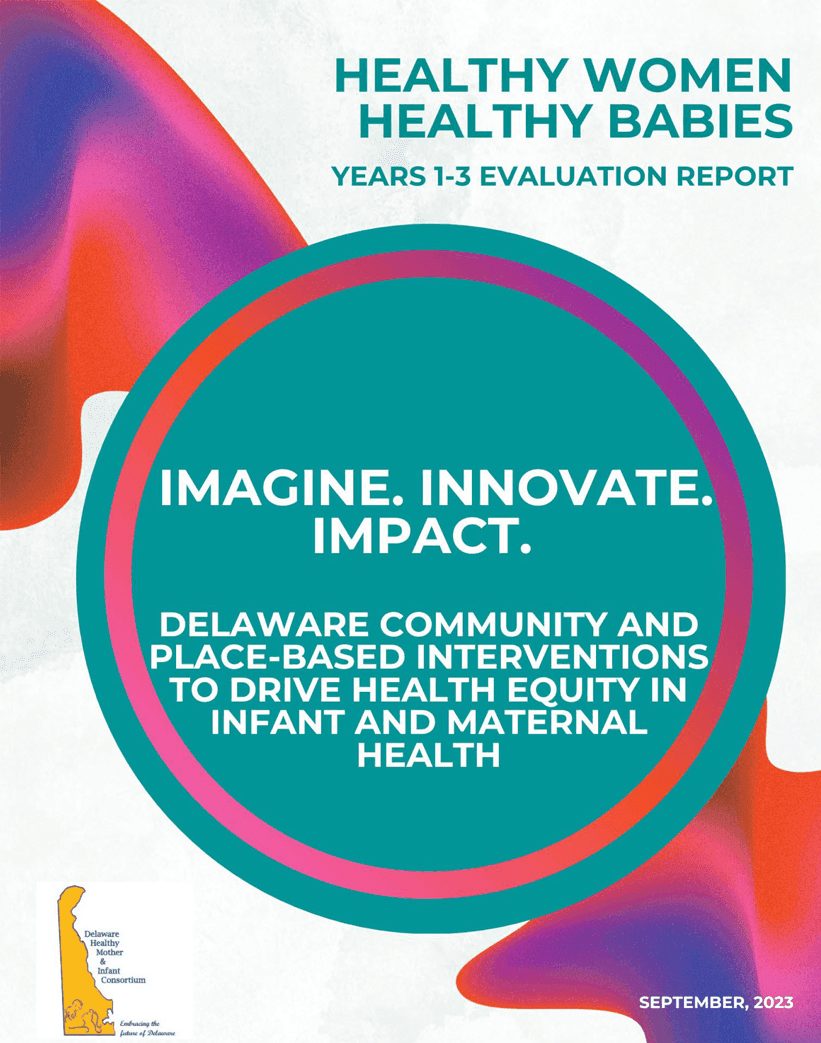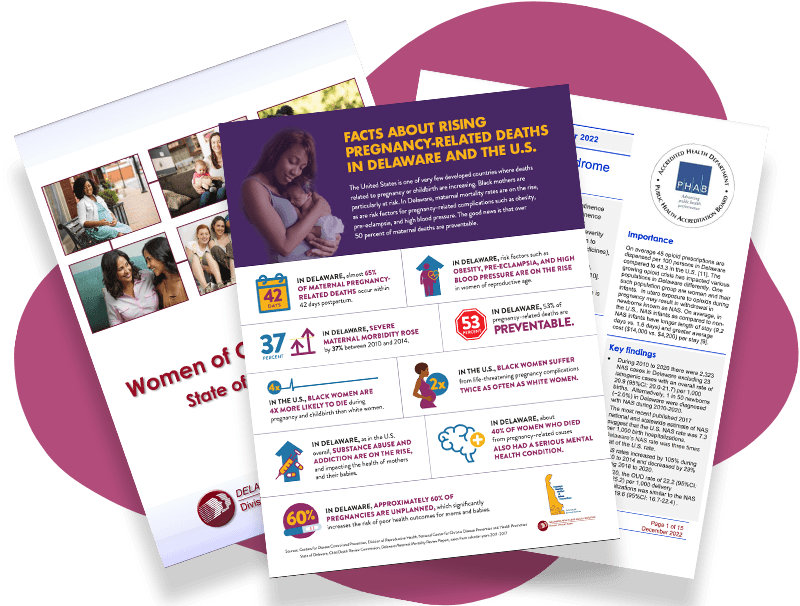Delaware Healthy Mother & Infant Consortium
The Delaware Healthy Mother & Infant Consortium (DHMIC) provides statewide leadership and coordination of efforts to prevent infant and maternal mortality and improve the health of women of childbearing age and infants throughout Delaware.
Join DHMIC
Become a committee member
Committee membership is open to organizations and individuals whose missions do not conflict with DHMIC priorities.
About DHMIC
In 2004, Governor Minner had a simple question: Why is it, she asked, that early entry into prenatal care for pregnant women in Delaware is at an all-time high, and yet there was no improvement in our dismal infant mortality rate? Not satisfied with the answers she was getting, the Governor signed Executive Order # 52 on June 2, 2004, to establish the Infant Mortality Task Force (IMTF). The Governor charged the Task Force to advise her of strategies to reduce infant mortality in Delaware. Additionally, she asked that the IMTF develop broad-based recommendations that are based on scientific evidence, defined partnerships, and expected contribution with timelines. Finally, she asked that the Task Force submit its report to her within nine months.
In May 2005, the IMTF presented its report, titled “Reducing Infant Mortality in Delaware — Recommendations of the Infant Mortality Task Force”, to the Governor with 20 recommendations on how to improve birth outcomes in Delaware. Recommendation #3 noted that at other times in the history of the state, the infant mortality rate (IMR) had drawn the attention of one administration or another. There had been organized efforts to bring the IMR under control. A subsequent administration saw the progress made and moved resources from that effort to address a different challenge. Over time, the IMR went back up. And the cycle would start all over again. To prevent that cycle from continuing, the Task Force called for a successor organization to oversee the implementation of the recommendations and continue to advocate for resources to sustain the effort across administrations. The Delaware Healthy Mother & Infant Contortion (DHMIC) is the successor organization called for by recommendation #3.
On January 26, 2006, the legislature responded to the recommendations by establishing the DHMIC in Delaware Code as the successor organization.
Delaware’s infant mortality rate was among the highest in the nation when the DHMIC was created. Hidden within that mortality rate was a significant racial disparity, as African American infants were more than twice as likely to die before their first birthday than Caucasian infants. The solution is for women, without regard to race or ethnicity, to be in optimal health before pregnancy. When women enter pregnancy with tobacco use, uncontrolled chronic disease, or unmanaged stress, in many cases, prenatal care has limited impact on improving their outcomes. Helping women be healthy and change unhealthy behaviors is only one part of the solution. Infant mortality is an indicator of the health of the community, which can directly or indirectly affect each of us.
Bylaws
DHMIC Bylaws
DHMIC Appointed Members
Dr. Priscilla Mpasi, MD, FAAP
Chair of the DHMIC
Tiffany Chalk, CMP
Vice-Chair of the DHMIC, Chair of the Well Woman/Black Maternal Health Committee
Dr. Lindsay Ashkenase, MD
Co-Chair of the Data Committee
Bridget Buckaloo, MSN, RNC-OB
Dr. Garrett Colmorgen, MD
Chair of the Delaware Perinatal Quality Collaborative
Ray Fitzgerald, J.D.
Co-Chair of the Social Determinants of Health Committee
Logan Herring, Sr., BA
Dr. Marshala Lee-McCall, MD, MPH, FAAFP
Dr. Julius Mullen Sr., Ed.D, LPCMH, NCC
Co-Chair of the Social Determinants of Health Committee
Dr. A.M. Richardson, DSL, RN
Forrest Watson III, BS, MBA
Representative Valerie Jones Giltner, RN
Senator Marie Pinkney, LCSW
Senator Bryant Richardson
Representative Kamela Smith
Dr. Alethea Miller, DNP, MSN, RN, CLC
Co-Chair of the Data Committee
Dr. Olubusola Ogunlade, MD
Division of Public Health Support
Leah A. Jones
Committees & Workgroups
DHMIC promotes a Life Course–inspired, evidence-based plan of action to achieve health equity with the greatest amount of impact, in the shortest time frame, with the most efficient use of resources. There are four committees and two workgroups that strive to create equal opportunity to thrive for all Delawareans.
Delaware Healthy Mother and Infant Consortium (DHMIC) Committee
Next Meeting: DelTech Terry Campus, Del One Conference Center
Social Determinants of Health Committee
Next Meeting: Virtual
Data Committee
Next Meeting: Virtual
Well Woman/Black Maternal Health Committee
Next Meeting: Virtual
Summit Planning Committee
Next meeting
No upcoming meetings at this time.

Strategic Initiatives

Delaware Perinatal Quality Collaborative
Health Equality vs. Health Equity
We should all have an equal opportunity to achieve health and well-being. We can accomplish that by eliminating the systemic inequities surrounding those who are disadvantaged due to poverty, physical or mental disability, race, or any other trait or situation that creates a barrier to living a healthy life.
Kitty Esterly, MD, Health Equity Champion Award
A community health equity champion is any person or organization that goes the extra mile to improve health and well-being throughout Delaware. We want to make sure they get the recognition they deserve! This award is given annually to both an individual and an organization.
Learn moreAnnual Summits
Resource Center

Latest: Healthy Women Healthy Babies Years 1-3 Evaluation Report
We have compiled a collection of resources about the health of women, infants, and families:
Websites:

Free Resources

“Reproductive justice will be attained when all people have the economic, social, and political power and the means to make decisions about their bodies, sexuality, health, and families.”